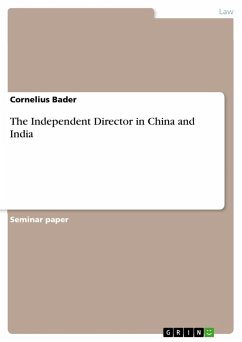Seminar paper from the year 2010 in the subject Law - Comparative Legal Systems, Comparative Law, grade: A+, Vanderbilt University (Law School), language: English, abstract: The "independent director" has become a centerpiece of modern corporate governance. However, the concept of "independence", and the ability of independent directors to fulfill their roles, remains deeply problematical. In the course of the discussion on the proper role of independent directors that unfolded in Europe and the United States during the 1980s and 1990s and peaked in the wake of the Enron scandal, rules on director independence have found their way to the corporate governance regimes of developing countries that turned their head to western economies. Particularly in China and India, independent directors have taken their place on company boards, earning mixed responses from the academic and business community. What is the current state of Indian and Chinese rules on director independence? What tensions do they address and create? And what can be done to optimize the achievement of their objectives? The goal of this article is to examine the status quo of director independence in the two countries, to put the regulations into their historic and political context, to summarize practical experiences with the new institution, and to point to possible future developments.








